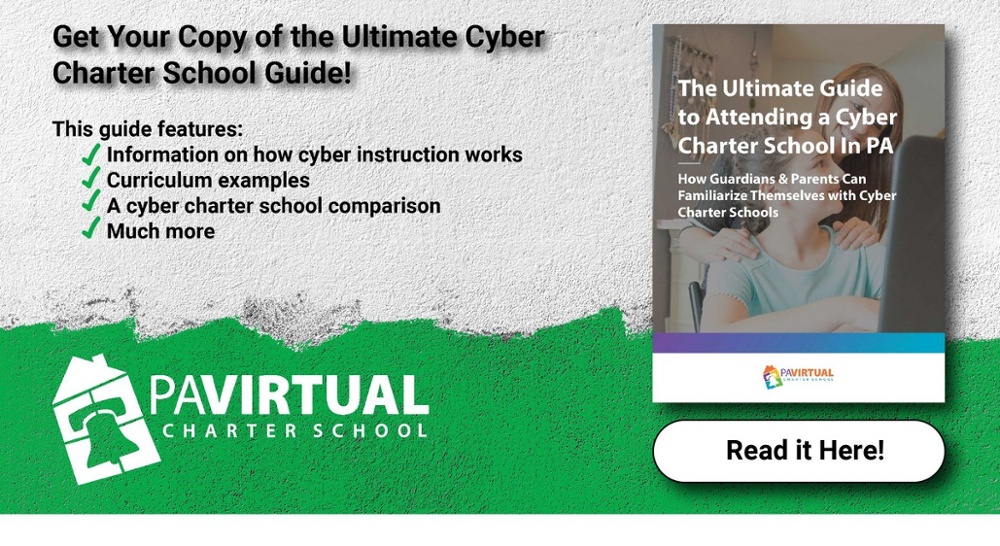During my thirteen years of cyber education, my Learning Coach and I sometimes had to defend our family’s school choice. Usually, the objections came from well-meaning people who heard stories from others or assumed that cyber school just didn’t cut it. Today, we’re going to debunk five common myths about cyber school. Here are 5 myths about cyber school debunked.
Myth #1 – Socialization
One of the biggest myths about cyber school is that cyber school students are unsocialized. Because they aren’t being educated in a physical building with other students, many people think they cannot be developing or growing those skills.
This is false!
Truthfully, cyber school provides an opportunity to pursue individualized socialization. There are few limits to how you can socialize when you are a cyber school student.
When I was in middle school, I volunteered at the library. In high school, I was involved in leadership programs, robotics teams, and my church’s youth group. I also worked at a summer camp. My best friend, a former PA Cyber student, was heavily involved in dance. Other students are on sports teams, take music lessons, learn martial arts, or start a part-time job.
“But those are just after-school activities. You aren’t socializing like you would at a real school!”
No, cyber school students don’t socialize in the same way. We aren’t in the same room. We can’t share snacks, exchange looks, or poke each other. But cyber school students absolutely develop friendships in their classes.
When I was in elementary school, I had a best friend in homeroom named Noelle. Anytime the teacher assigned group work for breakout rooms, we teamed up. I remember drawing nature pictures on the whiteboard together and having a blast.
In middle school, I was in an advanced learners group called SOAR. My friend Jon and I always talked outside of class about what we were learning, and about our interests. He came from a different background than I did, and we were both able to expand our understanding of the world.
During high school, I developed a rapport with most of my classmates. We all chatted before classes started about current events, pop culture, and what we were learning. My specific group of friends usually chose to work together on projects, and we talked outside of school about life. I also organized a group of online classmates to meet in person and see a movie together.
Thanks to cyber school, I developed the skills to seek out and initiate friendship. I also learned how to interact with adults, and I had the opportunity to pursue the hobbies that interested me. Rather than being sheltered by cyber schooling at home, my family took advantage of the flexibility offered and helped me excel.
Myth #2 – Screen Time
If sitting in front of a computer for five or six hours at a time is what you think of when you hear “cyber school,” I understand why you would dislike cyber school or be wary of it. That is not what school should be.
However, that is not what cyber school is supposed to be.
Cyber school has between one and four hours of live classes, depending on your grade level, age, learning style, and attention span. Between those classes, there is time built in the day to take breaks, eat snacks, read physical books, write in a notebook, run around outside, work in workbooks, and use materials like paints and clays. Because of the flexibility of cyber school, there might also be practices for sports, dance, or theater intermixed throughout the day as well.
Being a cyber school student is simply not equivalent to too much screen time.
Myth #3 – Difficulty
When the myth of difficulty comes up, it usually means one of two things. First, that students are not receiving the same quality of education online that they would in the brick and mortar classroom. Second, that students don’t have to try as hard because they have the answer key in front of them: they can just cheat.
Both of these have a grain of truth to them. In terms of quality, students may not receive excellent online education if their teachers have not been properly trained and prepared for online teaching. As for academic dishonesty, it is easier to cheat when no one is watching you.
However, to say brick and mortar school is difficult and cyber school is easy is a huge generalization, because all schools are different.
You have to actively seek out the best options for your students. A district will not challenge your student more, simply by virtue of being a district school. And in the same way, a cyber school will not challenge your student more just because it is a cyber school.
I have heard from other cyber-schooled friends about their experiences. In some cyber models, the Learning Coach is not actively involved, and their schoolwork was “just too easy.” I have also heard stories from brick and mortar students where “the system failed them.”
Those stories have to do with individuals. They speak to the failure of an individual school, not the failure of a model.
Cyber learning done right is a partnership between the student, Learning Coach, and teacher. PA Virtual’s model includes the Learning Coach role because students need someone home with them who is invested in them and their education.
Myth #4 – College
There is a mysterious fog surrounding cyber school and college. It isn’t clear how cyber school students get into college, or if they can get into college, or if they’ll even survive being in college!
I’m here to set the record straight. Cyber school students can apply to college just like their brick and mortar peers. Cyber school students will be accepted into college by the same merits. And, cyber school students can survive in college.
As a PA Virtual student who worked hard, I was well prepared for college. I have excelled. I work harder and do better than many of my peers who went to brick and mortar school.
However, that is not a slam against the concept of brick and mortar school. I have friends in college who never attended online school, and they work hard and excel right alongside me. There is nothing inherent in online education, or in brick and mortar education, that makes it better. Let’s work together to not pit the education models against each other. Everyone is trying to find the best way that they learn.
Myth #5 – Teachers
I have heard a lot of questions about teachers from prospective families during my time with PA Virtual. The two most prevalent are in regards to qualifications and student-teacher interaction.
Cyber school is a newer model, and it isn’t clear whether they abide by the same rules as districts do when it comes to hiring. PA Virtual is a public school, just like a local district school, so our teachers are qualified and state-certified. Not only do they check the boxes for general teaching ability, but they are trained to teach online. Online teaching is different, and it’s important to us that our teachers can teach online well.
Cyber school is also a different model. Can students stay after class to talk to their teacher? Can they drop by their office if they have a question? How exactly do students get more one-on-one interaction with teachers if they aren’t in the same room?
At PA Virtual, students can get individual help from their teacher in a few different ways. Send them an email, and they will either provide additional resources to help you or find a time to meet online. You can also drop by their scheduled office hours. When I was at PA Virtual, I liked to stop by office hours frequently, either to chat when my teacher wasn’t busy, or to get additional help.
If you want to get to know your teacher better, there are ways to do that, too. I always logged into class a few minutes early, so I had time to talk with them. Teachers also sponsor clubs at PA Virtual, so you can get to know them at club meetings.
My teachers were great. I had one math teacher who pulled numbered ping pong balls out of a giant Lego head in order to call on us. One of my science teachers had alpacas and would show us pictures of them. My favorite English teacher had finger puppets of classic literary authors. My history teacher had a cat that always walked in front of his webcam in the middle of class.
Conclusion
The falsehood in these myths is that there is something inherent about the brick and mortar model that makes it better. The cyber model is expected to put on boxing gloves and prove whether it measures up. We have to stop measuring schools from the big picture of “model” and look more closely at individual schools.
If I look at education from that perspective, then I can say this: I would have excelled at any great school, whether it was my local district school, a private school, or an online school. My family chose PA Virtual. It’s a great school, and I thrived.
The next time you are researching schools, whether they are online or in person, I hope these debunked myths will help you evaluate each individual school. Any model can teach students well with the right people, methods, and investment.
If you'd like to learn more about cyber schooling and how it all works, check out our Ultimate Guide to Attending a Cyber Charter School in PA.
 About the Author: Alexis Dingeldein attended PA Virtual for all of grade school and graduated in 2017. During her time at PA Virtual, she wrote and self-published six novels. She is currently at Geneva College studying business and writing.
About the Author: Alexis Dingeldein attended PA Virtual for all of grade school and graduated in 2017. During her time at PA Virtual, she wrote and self-published six novels. She is currently at Geneva College studying business and writing.






Comments